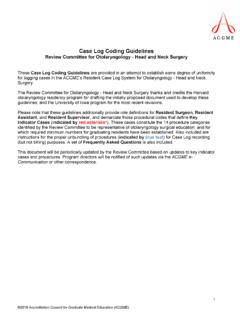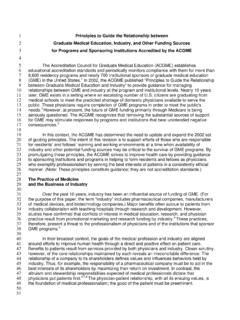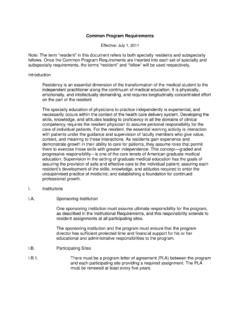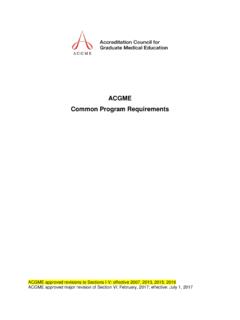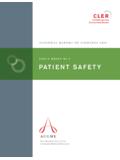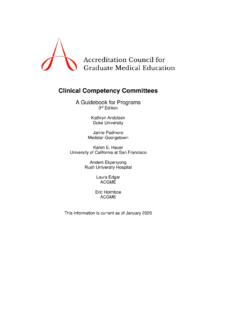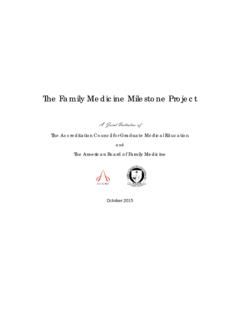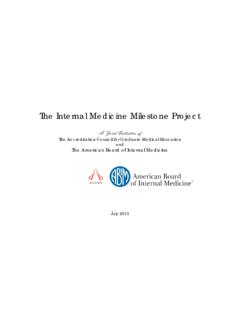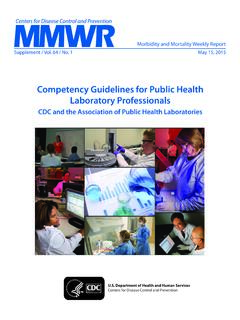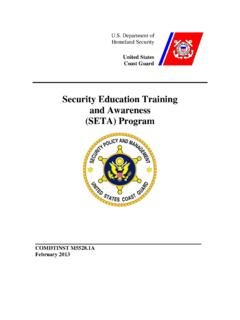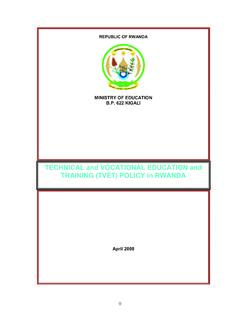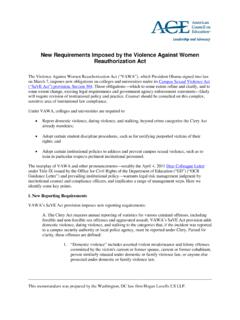Transcription of 2 Graduate Medical Education, Industry, and Other Funding ...
1 1 Principles to Guide the Relationship between 2 Graduate Medical education , Industry, and Other Funding Sources 3 for Programs and Sponsoring Institutions Accredited by the ACGME. 4. 5 The Accreditation Council for Graduate Medical education (ACGME) establishes 6 educational accreditation standards and periodically monitors compliance with them for more than 7 8,800 residency programs and nearly 700 institutional sponsors of Graduate Medical education 8 (GME) in the United In 2002, the ACGME published Principles to Guide the Relationship 9 between Graduate Medical education and Industry to provide guidance for managing 10 relationships between GME and industry at the program and institutional levels. Nearly 10 years 11 later, GME exists in a setting where an escalating number of citizens are graduating from 12 Medical schools to meet the predicted shortage of domestic physicians available to serve the 13 public. These physicians require completion of GME programs in order to meet the public's 14 However, at present, the future of GME Funding primarily through Medicare is being 15 seriously questioned.
2 The ACGME recognizes that removing the substantial sources of support 16 for GME may stimulate responses by programs and institutions that bear unintended negative 17 18. 19 In this context, the ACGME has determined the need to update and expand the 2002 set 20 of guiding principles. The intent of this revision is to support efforts of those who are responsible 21 for residents' and fellows' learning and working environments at a time when availability of 22 industry and Other potential Funding sources may be critical to the survival of GME programs. By 23 promulgating these principles, the ACGME strives to improve health care by providing guidance 24 to sponsoring institutions and programs in helping to form residents and fellows as physicians 25 who exemplify professionalism by serving the best interests of patients in a consistently ethical 26 manner. (Note: These principles constitute guidance; they are not accreditation standards.)
3 27. 28 The Practice of Medicine 29 and the Business of Industry 30. 31 Over the past 10 years, industry has been an influential source of Funding of GME. (For 32 the purpose of this paper, the term industry includes pharmaceutical companies, manufacturers 33 of Medical devices, and biotechnology companies.) Major benefits often accrue to patients from 34 industry collaboration with teaching hospitals through research and development. However, 35 studies have confirmed that conflicts of interest in Medical education , research, and physician 36 practice result from promotional marketing and research Funding by These practices, 37 therefore, present a threat to the professionalism of physicians and of the institutions that sponsor 38 GME 39. 40 In their broadest context, the goals of the Medical profession and industry are aligned 41 around efforts to improve human health through a direct and positive effect on patient care. 42 Benefits to patients result from services provided by both physicians and industry.
4 Closer scrutiny, 43 however, of the core relationships maintained by each reveals an irreconcilable difference. The 44 relationship of a company to its shareholders defines values and influences behaviors held by 45 industry. Thus, for example, the responsibility of a pharmaceutical company must be to act in the 46 best interests of its shareholders by maximizing their return on investment. In contrast, the 47 altruism and stewardship responsibilities expected of Medical professionals dictate that 48 physicians put patients ,7,8 The physician-patient relationship, with all its ensuing values, is 49 the foundation of Medical professionalism; the good of the patient must be preeminent. 50. 51. Relationship of GME to Industry and Other Funding Sources ACGME October 2011 2. 52 The Ongoing Challenge 53 for Graduate Medical education 54. 55 This conflict between the professional responsibilities of the physician and the business 56 objectives of industry is apparent in the conduct of industry's promotional activities.
5 Industry 57 engages in advertising campaigns and associated marketing activities because they work;. 58 successful promotion increases shareholder It is the chief means by which industry relates 59 to physicians, residents, and Medical students. Promotion by industry frequently occurs through 60 financial support for a broad array of educational programs, industry-sponsored research, and 61 social events. 62. 63 Faculty members, residents, and fellows alike communicate professional values through 64 the learning and working environment created by sponsoring institutions and residency programs. 65 The structured curriculum, , conferences, grand rounds, and Other formal learning activities, is 66 the most obvious of the contexts in which transmittal of values occurs. While less apparent, 67 though with equal and sometimes even greater intensity, the hidden or informal curriculum 68 communicates values at the level of organizational structure and culture, influencing such areas 69 as policy development, evaluation, resource allocation, and institutional Transmittal of 70 values thus becomes a pervasive component of the educational process relative to all manner of 71 professional relationships within the sponsoring institution and the individual program.
6 Residents 72 and fellows learn to relate to industry in much the same manner they develop Other professional 73 relationships, by observing administration and faculty behavior. The learning and working 74 environment, therefore, has a direct bearing on the learned professionalism of the residents and 75 fellows training being educated within Regrettably, with regard to support from industry, the 76 learning environment sometimes manifests an entitlement to largesse of drug companies. 12. 77. 78 Instances of inappropriate relationships with industry and its largesse are often found in 79 the expectations for outside support demonstrated by residency programs and sponsoring 80 institutions. Examples that remain all-too-familiar practices include: drug lunches with obvious 81 promotional intent; industry-sponsored lectures with negative results of clinical trials given less or 82 no attention; social functions attached to information sessions having a clearer marketing 83 objective than scientific purpose; and promotional activity in which residents and even Medical 84 students receive slides, lecture materials, and honoraria, and subsequently act as experts.
7 85 delivering the packaged information at continuing Medical education events. A more subtle 86 promotional activity involves Funding of fellowships established by some pharmaceutical 87 companies that retain their companies' names. Thus, a fellowship program and/or an individual 88 fellow supported by a particular pharmaceutical company is indelibly tied to the The 89 risk of compromising professional judgment resulting from these and Other activities can be 90 egregious, and both the profession and the public express concern over blatant misuse of 91 industry ,15,16 Promotional support has been proven to influence Medical decision- 92 making, and studies find that decision makers are unable to recognize its ,18. 93. 94 Over the last several years, some residency programs, fellowships, and sponsoring 95 institutions have adopted policies that curtail these promotional activities relating to their GME. 96 However, the increasingly constrained Funding environment under which programs 97 and institutions may operate will likely fuel the temptation to justify increased dependence on 98 industry Funding .
8 99. 100 Recently, Other sources of Funding for GME outside of Medicare and Other government 101 programs, ( , Other sources ) have also emerged. Sponsoring institutions occasionally receive 102 requests from parents to fund a son or daughter, or even from foreign governments to fund a 103 group of individuals in a residency program or fellowship. Likewise, individuals may offer to pay 104 their own way through residency or fellowship programs. The influence inherent in such instances Relationship of GME to Industry and Other Funding Sources ACGME October 2011 3. 105 does not directly undermine values and influence behaviors of individuals as in the case of 106 industry. However, these often well-meaning gestures have the potential for compromising the 107 recruitment, selection, and promotion policies of sponsoring institutions, creating class differences 108 among peer residents and fellows, causing relaxation of acceptance standards for particular 109 individuals, or developing unequal expectations for satisfactory completion of programs.
9 110. 111 Guidance from Related Resources 112. 113 The ACGME and Other groups have published guidelines and resources to inform 114 physicians and organizations about conflicts of interest in Medical education , particularly 115 regarding gifts and support from industry. Among these are: the ethical opinion Gifts to 116 Physicians from Industry in the American Medical Association's Code of Medical Ethics;20 In the 117 Interest of Patients: Recommendations for Physician Financial Relationships and Clinical 118 Decision Making 21 and Industry Funding of Medical education 14 by the Association of American 119 Medical Colleges; the Accreditation Council for continuing Medical education 's Standards for 120 Commercial Support;22 and Code for Interactions with Companies by the Council of Medical 121 Specialty The Association of American Medical Colleges has addressed issues 122 regarding financial conflicts of interest in research through its Task Force on Financial Conflicts of 123 Interest in In addition, the Institute of Medicine published an extensive report with 124 recommendations on Conflict of Interest in Medical Research, education , and Practice, with a 125 chapter devoted specifically to Conflicts of Interest in Medical education .
10 25. 126. 127 These guidelines and resources outline what constitutes ethical behavior for both 128 physicians and their related organizations. Without exception, they establish that it is unethical for 129 physicians to accept gifts or support in any form that results in prescription or recommendation of 130 a particular drug or product, or delivery of particular clinical action. 131. 132 The Role of ACGME: 133 The General Competencies 134. 135 In 1999 the ACGME identified six general physician competencies in its program and 136 institutional requirements. These competencies--Patient Care, Medical Knowledge, Practice- 137 based Learning and Improvement, Interpersonal and Communication Skills, Professionalism, and 138 Systems-based Practice--serve as organizing principles around which all GME residency and 139 fellowship curricula should be Residents and fellows must demonstrate achievement 140 in these competencies during and upon completion of their programs through appropriate 141 educational outcomes.
